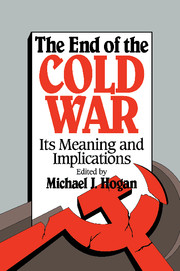Book contents
- Frontmatter
- Contents
- Preface
- The Authors
- Dedication
- 1 Introduction
- 2 An End to Which Cold War?
- 3 The Cold War, the Long Peace, and the Future
- 4 Quiet Cataclysm: Some Afterthoughts on World War III
- 5 Some Lessons from the Cold War
- 6 Nuclear Weapons and European Security during the Cold War
- 7 Victory in the Postwar Era: Despite the Cold War or Because of It?
- 8 The Wicked Witch of the West is Dead. Long Live the Wicked Witch of the East
- 9 The End and the Begining
- 10 A Balance Sheet: Lippmann, Kennan, and the Cold War
- 11 Why Did the Cold War Arise, and Why Did It End?
- 12 A View from Below
- 13 The End of the Cold War and the Middle East
- 14 The End of the Cold War in the Near East: What It Means for Historians and Policy Planners
- 15 After the Cold War: The United States, Germany, and European Security
- 16 The End of the Cold War: A Skeptical View
- 17 The End of the Cold War, the New Role for Europe, and the Decline of the United States
- 18 The Fading of the Cold War—and the Demystification of Twentieth-Century Issues
- 19 The U.S. Government, a Legacy of the Cold War
- 20 Foreign Policy, Partisan Politics, and the End of the Cold War
- 21 Beyond Bipolarity in Space and Time
- 22 A Usable Past for the Future
- Selective Bibliography
- Index
2 - An End to Which Cold War?
Published online by Cambridge University Press: 18 December 2009
- Frontmatter
- Contents
- Preface
- The Authors
- Dedication
- 1 Introduction
- 2 An End to Which Cold War?
- 3 The Cold War, the Long Peace, and the Future
- 4 Quiet Cataclysm: Some Afterthoughts on World War III
- 5 Some Lessons from the Cold War
- 6 Nuclear Weapons and European Security during the Cold War
- 7 Victory in the Postwar Era: Despite the Cold War or Because of It?
- 8 The Wicked Witch of the West is Dead. Long Live the Wicked Witch of the East
- 9 The End and the Begining
- 10 A Balance Sheet: Lippmann, Kennan, and the Cold War
- 11 Why Did the Cold War Arise, and Why Did It End?
- 12 A View from Below
- 13 The End of the Cold War and the Middle East
- 14 The End of the Cold War in the Near East: What It Means for Historians and Policy Planners
- 15 After the Cold War: The United States, Germany, and European Security
- 16 The End of the Cold War: A Skeptical View
- 17 The End of the Cold War, the New Role for Europe, and the Decline of the United States
- 18 The Fading of the Cold War—and the Demystification of Twentieth-Century Issues
- 19 The U.S. Government, a Legacy of the Cold War
- 20 Foreign Policy, Partisan Politics, and the End of the Cold War
- 21 Beyond Bipolarity in Space and Time
- 22 A Usable Past for the Future
- Selective Bibliography
- Index
Summary
Before we conclude that the Cold War era has ended, it might be well to decide which Cold War is under discussion. To telescope the past forty-five years into only a U.S.-Soviet confrontation might be convenient, but it is also ahistorical. While Americans and Russians, thankfully, did not kill each other in large numbers on battlefields, twenty-one million people did die in wars between the end of World War II and the Communist empire's collapse. Four million of these died in the Vietnam conflict of 1945 to 1975, and there were other casualties of that conflict in the realms of democratic and constitutional values that should not go unnoticed.
The Cold Wars, then, were of various intensities, not a single conflict, and many of the most important (and often most lethal) events of the post-1945 era occurred in those confrontations that were at times only faintly, if at all, related to the U.S.-Soviet struggle. The point deserves emphasis, not least because the policies that led to American involvement in these other, sometimes lethal, Cold Wars are continuing, even though the rationale that often shaped and drove those policies-anticommunism-has lost most of its validity and political appeal. There are historical continuities in U.S. foreign policy that need to be identified and closely examined, and those continuities can be missed, or, more often, dismissed amid the triumphalism that has multiplied like yellow ribbons since the tearing down of the Berlin Wall in November 1989 and the defeat of Iraqi forces in early 1991.
- Type
- Chapter
- Information
- The End of the Cold WarIts Meaning and Implications, pp. 13 - 20Publisher: Cambridge University PressPrint publication year: 1992
- 27
- Cited by



